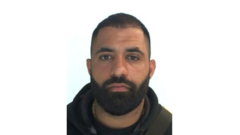Following a Human Rights Watch report, police officers reveal that mass arrests in El Salvador under President Nayib Bukele were driven by quotas and baseless accusations, undermining the government's crime-fighting narrative.
El Salvador's Police Scandals: Quotas and False Arrests in Bukele's Anti-Gang Push

El Salvador's Police Scandals: Quotas and False Arrests in Bukele's Anti-Gang Push
Recent revelations expose troubling practices within El Salvador's police force amid President Bukele's aggressive gang crackdowns.
In an alarming development concerning El Salvador's battle against gang violence, police officers are disclosing that the mass arrests initiated by President Nayib Bukele were influenced by unrealistic arrest quotas and rumors rather than substantial evidence. This revelation, highlighted in a recent Human Rights Watch report, sheds light on the troubling practices within El Salvador's national police force during the state of emergency that has been in effect since 2022.
Families of those arrested had previously voiced concerns that innocent individuals were being taken into custody based on neighborhood gossip or seemingly innocuous tattoos. Now, a group of several officers has corroborated these claims, stating they faced immense pressure to fulfill arrest targets set by their superiors. The objective was clear: to demonstrate success in Bukele's harsh crackdown on gangs, especially in the wake of claims that his policies would make a significant dent in the pervasive violence that has historically plagued the country.
The crackdown has reportedly led to a stark reduction in gang-related crime, seemingly transforming El Salvador into one of the safer nations in Central America. This dramatic shift has been a centerpiece of Bukele's public narrative, further bolstered during international engagements, where he sought to establish connections with global leaders. However, this newfound stability comes at a heavy cost, as many innocent individuals fall victim to arbitrary detentions spurred by misguided policing strategies.
Officers implicated in these practices reveal a climate of fear within the police force. Many expressed concern that failure to comply with arrest demands could tag them as accomplices of criminal organizations, leaving them vulnerable to prosecution. The balancing act between community safety and civil rights continues to unravel in El Salvador, raising profound questions about the ramifications of Bukele's controversial measures and the ethical implications of law enforcement practices that prioritize numbers over justice.



















